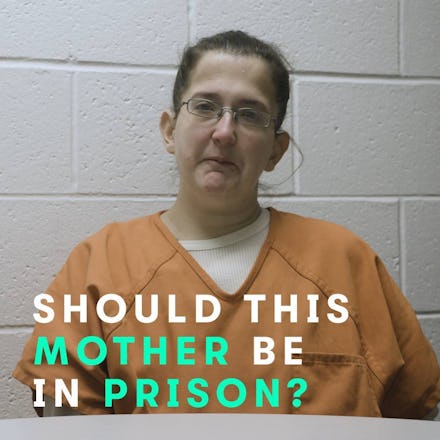Tressie Shaffer: Does this mother deserve to be in prison?

Tressie Shaffer, a 31-year-old mother of four, is currently serving an eighteen-month prison sentence in Oklahoma for permitting child abuse. But does she deserve to be behind bars?
On December 28, 2016, Shaffer woke up and made a bottle for her six-month-old daughter Zaylei, who was born with a disability. After tucking Zaylei back into bed, she then departed for her morning shift at Wendy’s. She left Zaylei, along with her three other children, in the care of her boyfriend and the baby’s father, Jason Scott, who was unemployed.
Shortly after arriving at work, Shaffer received devastating news from her manager: Zaylei had suffered life-threatening injuries and stopped breathing. She would go on to survive the incident, but Zaylei was left with severe long-lasting injuries. Investigators concluded those injuries were the result of Zaylei being violently shaken by Scott.
Shaffer and Scott were subsequently arrested by Tulsa Police on January 24. Scott was charged with child abuse by injury, and Shaffer was charged with permitting child abuse. A Tulsa jury found Shaffer guilty and sentenced her to 18 months in prison, which she is currently serving. Scott is awaiting trial and faces up to life in prison.
Shaffer was sentenced under Oklahoma’s “failure to protect” law, one of the strictest in the nation. The law allows for the prosecution of a parent who “knows or reasonably should know that the child will be placed at risk of abuse.” Prosecutors allege that Shaffer knew that Zaylei was injured even before the incident but left her in the care of Scott anyway (Shaffer admitted to police that she noticed a bruise on Zaylei’s face the day before the incident). Shaffer disputes those facts.
“I never, ever could imagine him hurting our daughter,” she says. “As a parent, even asking other parents, or other mothers for that matter, would you leave your child alone with their father?” And most of them are like, “Yeah, why not?”
Meanwhile, according to court documents, Scott admitted to shaking his daughter out of frustration. But he has pleaded not guilty to the crime. In a 9-1-1 call recorded directly following the alleged incident, an emotional Scott can be heard describing the details of what happened to a dispatcher.
He alleges that Zaylie’s injuries came from the genetic disease she was born with called Marfan Syndrome. “I would never hurt none of my children,” Scott says. “That thought’s never come through my mind, no matter how frustrated I’ve been, to hurt my children.”
According to Scott’s attorney, Clark Brewster, “The accusation blindly made, and then the gauntlet of having them arrested, is so incredibly unfair in a case like this.”
The case is complicated. According to a police affidavit, Scott had been accused of physical abuse of a minor child before. In addition, Shaffer had a previous boyfriend who was convicted of child abuse for shaking one of her other children.
Prosecutors stand behind Shaffer’s conviction, saying in a statement that her daughter will “endure a lifetime of difficulties” due to her choices.
But Shaffer’s attorney Ruth Hamilton said Oklahoma’s “failure to protect” law has unintended consequences, and in this case, has resulted in discriminating against Shaffer because she is a poor mother.
“Really, it comes down to if you’re a mother living in poverty, in particular, and anything happens to your kid, it’s your fault, that you weren’t wealthier and you didn’t have more resources,” Hamilton says.
Failure to protect laws were enacted across the country in order to protect vulnerable children from harm. But in states like Oklahoma, partners of abusers can receive up to life in prison for failing to prevent child abuse, which in some cases can be more prison time than the abusers receive themselves.
In one high-profile case from 2006, Tondalao Hall, a domestic violence survivor and mother of three, was sentenced to 30 years in prison for failing to stop her partner Robert Braxton from abusing their children. Although Braxton pleaded guilty to the crime, he has not served a day in prison. Hall has been behind bars since 2006.
Criminal justice reform organizations like the ACLU and Oklahomans for Criminal Justice Reform are working to overturn failure to protect laws, which they say have helped contribute to Oklahoma’s dismal criminal justice record. The state imprisons more individuals than any other and has also had the highest female incarceration rate in the nation for almost 30 years.
In the meantime, Shaffer’s only option for relief is clemency from Oklahoma’s governor. Still She Rises, an Oklahoma nonprofit that represents mothers in the criminal justice system, is currently working to raise awareness about her case, as well as raise money to provide necessary medical care for Zaylei and help keep Shaffer’s family together.
Learn more about that fundraising effort here.
Watch the video below and read more about Shaffer’s story here: